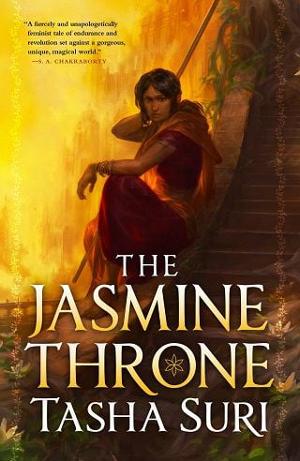Chapter 17: Priya
PRIYA
At first, she thought it was another dream.
The water at her feet. Winding of liquid, sleek as rope. The memory of her brother’s red-limned shadow.
Then she felt the magic of the yaksa singing through her. Salt in her veins.
She remembered the cosmic rivers. The World Egg.
(The World Peafowl. No. She wasn’t going to think of that.)
She looked around and—through the haze of dreaming, through sleep—forced herself to see.
Dark water beneath her. Water of a river. Three rivers, meeting and winding: a river of a red so deep it was nearly black, pulsing around her, ugly with life. A river of green flecked with gold, rolling like grass in a howl of wind; a river of darkness. Lightless, a rippling void.
She felt the rivers beneath her feet. The rivers winding through her skull. This was no dream.
This was—
“Priya.” Bhumika’s voice. She sounded relieved. “You’re finally here.”
Bhumika stood before her, waist deep in water. She was a shadow, darkness against the water; the river around her glowed faintly rose—shimmering with the red-limned light of her.
“The sangam,” Priya said, awed. “I haven’t seen it properly in so long.”
“The Hirana’s influence,” Bhumika murmured. Then she said, “What do you mean, properly?”
“When Meena strangled me, I thought I saw a glimpse of it. But not like this.”
“Well,” Bhumika murmured, displeased. “You didn’t tell me that when we talked of it, of course.”
Priya shrugged. “It didn’t seem important.”
Bhumika let out a sigh. Priya looked away from her, taking the sangam in.
The rivers wound beneath her, but above her they were mirrored, blanketed with stars. The cosmic rivers were a folded, creased flower—dozens of worlds pressed together, bound by the movement of water.
“At least this saves us meeting in person,” Bhumika said, watching as Priya turned all about—as she waded a circle through the water, three rivers roiling around her knees. “Tell me about the princess.”
“She’s sick.”
“I knew that, Priya.”
“Pramila is poisoning her with powdered needle-flower, dosed via wine,” added Priya. “I’m not sure if she intends to kill her or not, but—”
“It amounts to the same,” finished Bhumika. “You don’t think the emperor intends to finish her, then?”
Bhumika had feared that General Vikram and his household were one of the emperor’s targets—that he sought to remove his sister and the general in one fell, economical swoop. But Priya was not so sure now. She waded deeper, drawing closer to Bhumika, the cosmic confluence rising to her waist.
“No,” she said. “Not by poison. I think—I’m almost sure—he wants her to burn. But if she continues to refuse, perhaps he thinks the poison will have to do. Death by needle-flower would be… it would be a bad death.” She pushed the thought away. “Do you know what she did to anger him, Bhumika? Why he wants her to burn?”
“No, that I don’t know. Perhaps nothing, Priya.” Bhumika sounded suddenly weary. “There were women burned in the city today—imperial justice, apparently.”
“What? Did General Vikram order it?”
“One of the emperor’s men—never mind. It isn’t important. All you need to know is that the emperor takes pleasure in the burning. It gives him something of value. Serves him some kind of purpose—of control, or faith, I don’t know.”
Priya moved even closer, and through the strangeness of the sangam felt the echo of what Bhumika had seen: the burning women. The screams.
She stumbled. “That’s what the emperor wants?” she managed to say.
“Apparently so.”
The water glowed around them.
There had always been a distance between Priya and her elder temple sister. A gap that couldn’t be bridged by words. They had not been close, when the temple elders still lived and Priya was just a small girl. And from the moment Bhumika had taken Priya in, she’d made it clear they could not be family. The kinship between them had become something sharp and sour that bound them together regardless. It made honest words hard.
But something about this place—the strangeness of it, the river-ink of Bhumika before her, and the echo of Bhumika’s horror—loosened Priya’s tongue. Let the words flow free.
“I haven’t been able to come here in so long. Is that what it’s like to be twice-born?” she murmured. “To be able to enter the sangam and simply be—more than human?”
“We’re entirely human,” said Bhumika, “no matter what we can do.”
Priya laughed. Looked around pointedly, at the rivers knotted about them like compass roses. “You think this is human?”
“I think this is an aberration. A problem. And not something we should indulge in.”
“Then why are you here?” Priya challenged.
“Because I need to be,” snapped Bhumika. “Because so many things are falling apart. Because so many things are terribly wrong in Ahiranya, and I need to use every tool in my limited arsenal.”
“Do you meet Ashok here?” Priya asked bluntly. When Bhumika was silent she added, “I know he’s alive.”
“You should have told me you saw him,” Bhumika replied.
“You should have told me he was alive.”
“He didn’t want you to know.”
“Oh, you were lying to me out of respect for him. I see.”
“I never lied to you.”
“Don’t play silly games, Bhumika. You knew I believed he was dead, and you let me go on believing it. That was a choice to hide the truth from me. That’s as good as a lie.”
If Bhumika had been less shadow and more skin, she probably would have looked ashamed.
“He’s dangerous, Priya,” Bhumika said finally. “And I did exactly what I thought was necessary, for the child you were when he abandoned you.”
“But I’m not a child anymore.”
“Ah, Priya. Nothing is so simple.”
“No,” said Priya. “And I’m not asking for you to simplify the complexities of your life, Bhumika. I know my limits.” She sounded bitter, she knew. She didn’t really care. “But I can only act with the knowledge I have. The knowledge I deserve. So I am going to continue seeking the deathless waters. Because he needs them, and so do I.”
“Ashok wants to inflict chaos.”
“He wants to build a new world,” Priya said defensively, even though she’d said much the same to him, when they’d stood beneath the bower of bones. “A free Ahiranya.”
“No,” said Bhumika. “He wants a return to the old Ahiranya. He’s chasing a dream, a mirage, of a time when Ahiranya was isolated and alone and strong. How many hundreds upon hundreds of years ago was that?” Bhumika’s voice was all scorn. “He wants a world that can’t be forged without blood and death and sacrifice. In that way, he’s no different from the emperor.”
“Ahiranya is dying. Literally rotting.”
“But that doesn’t change our duty,” Bhumika said, “our need to keep it whole. If we are temple children still, then I can’t allow myself to forget that. And neither can you.”
“Ashok,” Priya said deliberately, “was the last person to treat me like family.”
One beat. Two.
“Well,” Bhumika said in a controlled voice. “If that’s how you feel, then that’s how you feel.”
“Bhumika, I am literally your servant.”
“And what else could you be? My long-lost sibling, perhaps? A distant cousin? I could hardly adopt you, could I? Being the general’s wife—using the general—requires certain sacrifices. It always has.”
Even in shadow—even in the sangam—Bhumika’s hand drifted without conscious thought to her waist. Priya felt oddly ashamed. She looked away.
Why are we always so ugly to one another?
“Anyway,” Priya said abruptly. “I want to end her poisoning and stop the needle-flower entirely. But I’m not the one who gives her the wine.”
Bhumika drummed her fingers lightly. “Could you make yourself that person?”
“Pramila doesn’t think much of servants.” Priya crossed her arms. “And she certainly doesn’t think much of me.”
“But she needs you,” said Bhumika.
“She needs much more than me. But yes.”
Bhumika nodded, as if she’d come to some decision.
“Keep the princess alive,” Bhumika said. “Just a little longer. That’s all I ask of you, Priya. What you do with Ashok…” She shook her head. “Just do this for me. That’s all.”
Then Bhumika reached out, both hands before her, and violently shoved Priya down under the water.
Priya woke with a gasp.
Malini lay deep asleep on the charpoy beside her. The sun was beginning to rise. And Priya would have almost—almost—believed it was just a dream, if not for the memory of the flint of Bhumika’s eyes. The magic singing and coiling in her blood.
The lines upon the floor, which had moved into a mimicry of stars.
 Fullepub
Fullepub 



